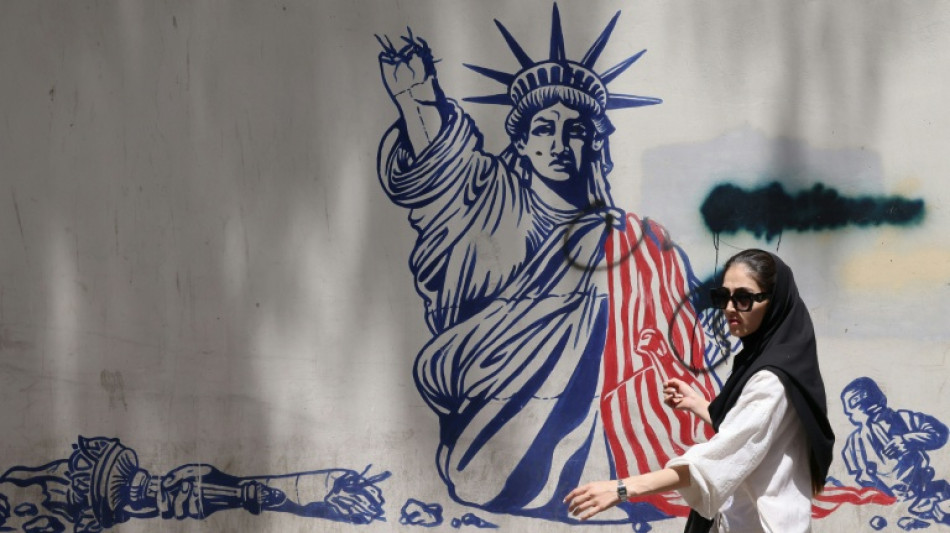

Trump calls on Israel not to strike as Iran defiant before talks
US President Donald Trump called Thursday on Israel not to attack Iran, saying a deal on its nuclear program remained close, but Tehran defiantly vowed to increase its output of enriched uranium ahead of new talks.
Trump acknowledged that an Israeli strike on Iran "may very well happen," although he stopped short of calling a strike imminent, and said the risk of "massive conflict" led the United States to draw down staff in the region.
"We are fairly close to a pretty good agreement," Trump told reporters.
Asked about his discussions with Israeli Prime Minister Benjamin Netanyahu, Trump said: "I don't want them going in, because I think it would blow it."
Trump quickly added: "Might help it actually, but it also could blow it."
Trump's Middle East pointman Steve Witkoff is set to hold a sixth round of talks with Iran on Sunday in Oman, which has mediated.
Trump again described himself as a man of peace.
"I'd love to avoid the conflict. Iran's going to have to negotiate a little bit tougher -- meaning they're going to have to give us some things that they're not willing to give us right now," he said.
- US troops in crosshairs -
Iran has ramped up rhetorical pressure before the talks, including with a threat to strike American bases in the region if the negotiations break down and conflict erupts.
"If the talks fail, the risk of military escalation becomes much more immediate," said Hamidreza Azizi, a visiting fellow at the German Institute for International and Security Affairs.
The United States on Wednesday said it was reducing embassy staff in Iraq -- long a zone of proxy conflict with Iran.
Israel, which counts on US military and diplomatic support, sees the cleric-run state in Tehran as an existential threat and hit Iranian air defenses last year.
Netanyahu has vowed less restraint since the unprecedented October 7, 2023 attack on Israel by Tehran-backed Hamas, which triggered the massive Israeli offensive in Gaza.
Israel again called for global action after the UN's International Atomic Energy Agency (IAEA) accused Iran of non-compliance with its obligations.
The United States and other Western countries, along with Israel, have repeatedly accused Iran of seeking a nuclear weapon, which it has repeatedly denied.
The IAEA's board of governors adopted a resolution condemning Iran's "non-compliance" with its nuclear obligations under the Non-Proliferation Treaty (NPT), carried by 19 votes in favour, out of 35 in total, diplomats said.
The resolution could lay the groundwork for European countries to invoke a "snapback" mechanism, which expires in October, that would reinstate UN sanctions eased under a 2015 nuclear deal negotiated by then US president Barack Obama.
- Iran says move 'extremist' -
Iran's nuclear chief, Mohammad Eslami, slammed the resolution as "extremist" and blamed Israeli influence.
Iran, he said, had upheld its commitments under the NPT but rolled back adherence to the 2015 deal after Trump withdrew the United States during his first term as president and imposed sweeping sanctions.
"They can't expect us to fulfill them without them (Western countries) honoring any of their commitments," Eslami said.
In response to the resolution, Iran said it would launch a new enrichment center in a secure location.
Iran would also replace "all of these first-generation machines with sixth-generation advanced machines" at the Fordo uranium enrichment plant, said Behrouz Kamalvandi, spokesman of the Atomic Energy Organization of Iran.
This means "our production of enriched material will increase significantly," he added.
Eslami said enrichment would begin at the new "invulnerable" site when machines were installed.
Iran currently enriches uranium to 60 percent, far above the 3.67-percent limit set in the 2015 deal and close, though still short, of the 90 percent needed for a nuclear warhead.
Following Iran's vow on uranium, the European Union called on it "to show restraint."
Iran's UN representative Amir Saeid Iravani has said Tehran will consider "proportionate responses" if the snapback mechanism is triggered -- including "starting the process of withdrawal" from the NPT.
H.Schmidtke--NRZ




